LAWS 1018 Business Law Assignment: Contract and Exclusion Clauses
VerifiedAdded on 2023/06/07
|6
|1513
|263
Homework Assignment
AI Summary
This business law assignment analyzes a scenario involving a musician, Rob, and the manager of the Fancy Hotel, Steve. The assignment addresses two key issues: the enforceability of an oral agreement despite a written contract, and the validity of an exclusion clause. The solution applies legal principles such as the parole evidence rule and the concept of collateral contracts to determine whether the hotel is obligated to provide equipment to Rob. The assignment also examines the communication of exclusion clauses, referencing relevant case law like Thornton v Shoe Lane Parking and Olley v Marlborough Court, to determine if the hotel can be held liable for the loss of Rob's car due to negligence. The analysis provides a detailed application of the law to the facts, leading to conclusions on the obligations of the hotel and Rob's ability to sue for damages. The assignment uses the IRAC method and includes legal references in Harvard style.
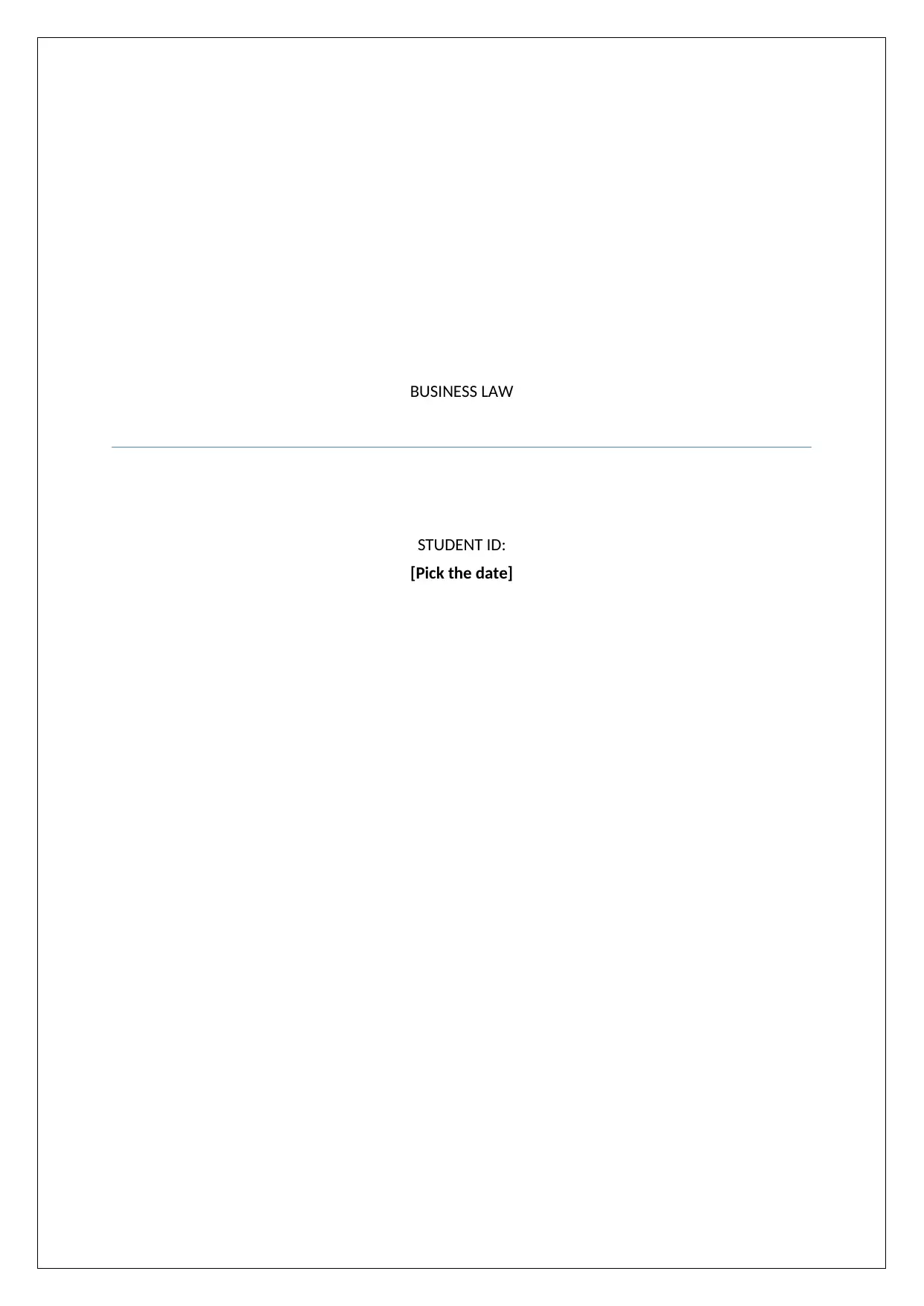
BUSINESS LAW
STUDENT ID:
[Pick the date]
STUDENT ID:
[Pick the date]
Paraphrase This Document
Need a fresh take? Get an instant paraphrase of this document with our AI Paraphraser
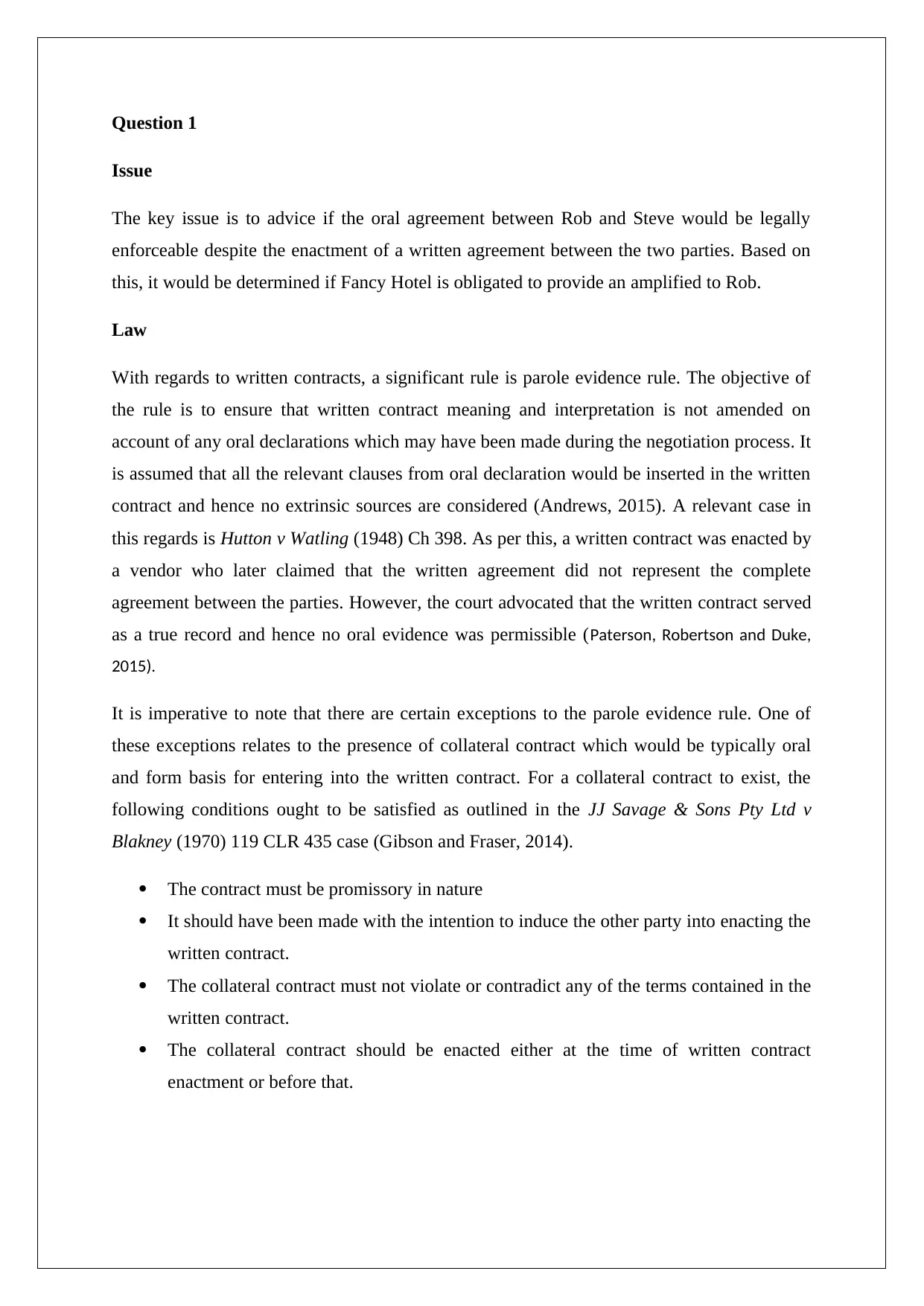
Question 1
Issue
The key issue is to advice if the oral agreement between Rob and Steve would be legally
enforceable despite the enactment of a written agreement between the two parties. Based on
this, it would be determined if Fancy Hotel is obligated to provide an amplified to Rob.
Law
With regards to written contracts, a significant rule is parole evidence rule. The objective of
the rule is to ensure that written contract meaning and interpretation is not amended on
account of any oral declarations which may have been made during the negotiation process. It
is assumed that all the relevant clauses from oral declaration would be inserted in the written
contract and hence no extrinsic sources are considered (Andrews, 2015). A relevant case in
this regards is Hutton v Watling (1948) Ch 398. As per this, a written contract was enacted by
a vendor who later claimed that the written agreement did not represent the complete
agreement between the parties. However, the court advocated that the written contract served
as a true record and hence no oral evidence was permissible (Paterson, Robertson and Duke,
2015).
It is imperative to note that there are certain exceptions to the parole evidence rule. One of
these exceptions relates to the presence of collateral contract which would be typically oral
and form basis for entering into the written contract. For a collateral contract to exist, the
following conditions ought to be satisfied as outlined in the JJ Savage & Sons Pty Ltd v
Blakney (1970) 119 CLR 435 case (Gibson and Fraser, 2014).
The contract must be promissory in nature
It should have been made with the intention to induce the other party into enacting the
written contract.
The collateral contract must not violate or contradict any of the terms contained in the
written contract.
The collateral contract should be enacted either at the time of written contract
enactment or before that.
Issue
The key issue is to advice if the oral agreement between Rob and Steve would be legally
enforceable despite the enactment of a written agreement between the two parties. Based on
this, it would be determined if Fancy Hotel is obligated to provide an amplified to Rob.
Law
With regards to written contracts, a significant rule is parole evidence rule. The objective of
the rule is to ensure that written contract meaning and interpretation is not amended on
account of any oral declarations which may have been made during the negotiation process. It
is assumed that all the relevant clauses from oral declaration would be inserted in the written
contract and hence no extrinsic sources are considered (Andrews, 2015). A relevant case in
this regards is Hutton v Watling (1948) Ch 398. As per this, a written contract was enacted by
a vendor who later claimed that the written agreement did not represent the complete
agreement between the parties. However, the court advocated that the written contract served
as a true record and hence no oral evidence was permissible (Paterson, Robertson and Duke,
2015).
It is imperative to note that there are certain exceptions to the parole evidence rule. One of
these exceptions relates to the presence of collateral contract which would be typically oral
and form basis for entering into the written contract. For a collateral contract to exist, the
following conditions ought to be satisfied as outlined in the JJ Savage & Sons Pty Ltd v
Blakney (1970) 119 CLR 435 case (Gibson and Fraser, 2014).
The contract must be promissory in nature
It should have been made with the intention to induce the other party into enacting the
written contract.
The collateral contract must not violate or contradict any of the terms contained in the
written contract.
The collateral contract should be enacted either at the time of written contract
enactment or before that.
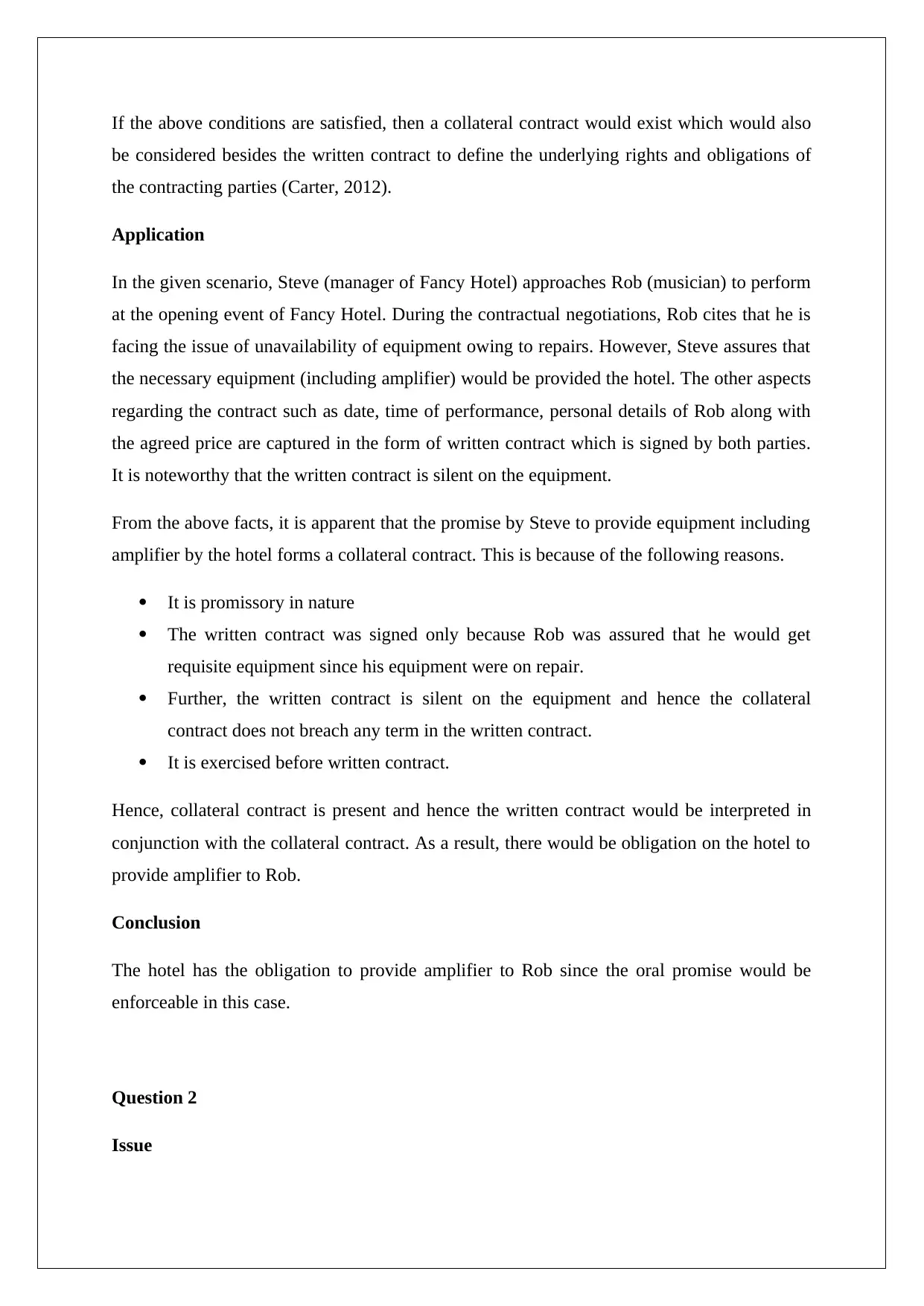
If the above conditions are satisfied, then a collateral contract would exist which would also
be considered besides the written contract to define the underlying rights and obligations of
the contracting parties (Carter, 2012).
Application
In the given scenario, Steve (manager of Fancy Hotel) approaches Rob (musician) to perform
at the opening event of Fancy Hotel. During the contractual negotiations, Rob cites that he is
facing the issue of unavailability of equipment owing to repairs. However, Steve assures that
the necessary equipment (including amplifier) would be provided the hotel. The other aspects
regarding the contract such as date, time of performance, personal details of Rob along with
the agreed price are captured in the form of written contract which is signed by both parties.
It is noteworthy that the written contract is silent on the equipment.
From the above facts, it is apparent that the promise by Steve to provide equipment including
amplifier by the hotel forms a collateral contract. This is because of the following reasons.
It is promissory in nature
The written contract was signed only because Rob was assured that he would get
requisite equipment since his equipment were on repair.
Further, the written contract is silent on the equipment and hence the collateral
contract does not breach any term in the written contract.
It is exercised before written contract.
Hence, collateral contract is present and hence the written contract would be interpreted in
conjunction with the collateral contract. As a result, there would be obligation on the hotel to
provide amplifier to Rob.
Conclusion
The hotel has the obligation to provide amplifier to Rob since the oral promise would be
enforceable in this case.
Question 2
Issue
be considered besides the written contract to define the underlying rights and obligations of
the contracting parties (Carter, 2012).
Application
In the given scenario, Steve (manager of Fancy Hotel) approaches Rob (musician) to perform
at the opening event of Fancy Hotel. During the contractual negotiations, Rob cites that he is
facing the issue of unavailability of equipment owing to repairs. However, Steve assures that
the necessary equipment (including amplifier) would be provided the hotel. The other aspects
regarding the contract such as date, time of performance, personal details of Rob along with
the agreed price are captured in the form of written contract which is signed by both parties.
It is noteworthy that the written contract is silent on the equipment.
From the above facts, it is apparent that the promise by Steve to provide equipment including
amplifier by the hotel forms a collateral contract. This is because of the following reasons.
It is promissory in nature
The written contract was signed only because Rob was assured that he would get
requisite equipment since his equipment were on repair.
Further, the written contract is silent on the equipment and hence the collateral
contract does not breach any term in the written contract.
It is exercised before written contract.
Hence, collateral contract is present and hence the written contract would be interpreted in
conjunction with the collateral contract. As a result, there would be obligation on the hotel to
provide amplifier to Rob.
Conclusion
The hotel has the obligation to provide amplifier to Rob since the oral promise would be
enforceable in this case.
Question 2
Issue
⊘ This is a preview!⊘
Do you want full access?
Subscribe today to unlock all pages.

Trusted by 1+ million students worldwide
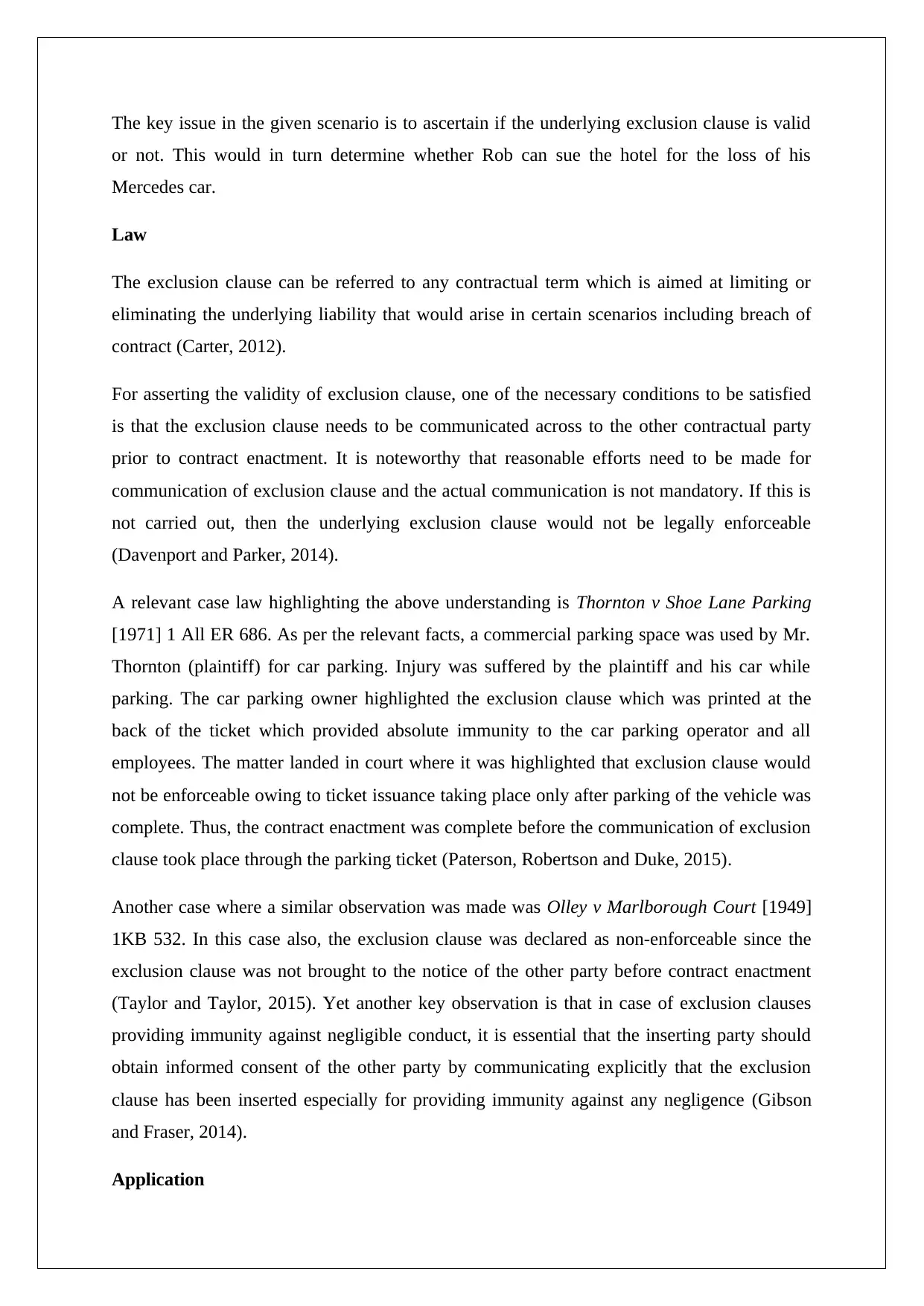
The key issue in the given scenario is to ascertain if the underlying exclusion clause is valid
or not. This would in turn determine whether Rob can sue the hotel for the loss of his
Mercedes car.
Law
The exclusion clause can be referred to any contractual term which is aimed at limiting or
eliminating the underlying liability that would arise in certain scenarios including breach of
contract (Carter, 2012).
For asserting the validity of exclusion clause, one of the necessary conditions to be satisfied
is that the exclusion clause needs to be communicated across to the other contractual party
prior to contract enactment. It is noteworthy that reasonable efforts need to be made for
communication of exclusion clause and the actual communication is not mandatory. If this is
not carried out, then the underlying exclusion clause would not be legally enforceable
(Davenport and Parker, 2014).
A relevant case law highlighting the above understanding is Thornton v Shoe Lane Parking
[1971] 1 All ER 686. As per the relevant facts, a commercial parking space was used by Mr.
Thornton (plaintiff) for car parking. Injury was suffered by the plaintiff and his car while
parking. The car parking owner highlighted the exclusion clause which was printed at the
back of the ticket which provided absolute immunity to the car parking operator and all
employees. The matter landed in court where it was highlighted that exclusion clause would
not be enforceable owing to ticket issuance taking place only after parking of the vehicle was
complete. Thus, the contract enactment was complete before the communication of exclusion
clause took place through the parking ticket (Paterson, Robertson and Duke, 2015).
Another case where a similar observation was made was Olley v Marlborough Court [1949]
1KB 532. In this case also, the exclusion clause was declared as non-enforceable since the
exclusion clause was not brought to the notice of the other party before contract enactment
(Taylor and Taylor, 2015). Yet another key observation is that in case of exclusion clauses
providing immunity against negligible conduct, it is essential that the inserting party should
obtain informed consent of the other party by communicating explicitly that the exclusion
clause has been inserted especially for providing immunity against any negligence (Gibson
and Fraser, 2014).
Application
or not. This would in turn determine whether Rob can sue the hotel for the loss of his
Mercedes car.
Law
The exclusion clause can be referred to any contractual term which is aimed at limiting or
eliminating the underlying liability that would arise in certain scenarios including breach of
contract (Carter, 2012).
For asserting the validity of exclusion clause, one of the necessary conditions to be satisfied
is that the exclusion clause needs to be communicated across to the other contractual party
prior to contract enactment. It is noteworthy that reasonable efforts need to be made for
communication of exclusion clause and the actual communication is not mandatory. If this is
not carried out, then the underlying exclusion clause would not be legally enforceable
(Davenport and Parker, 2014).
A relevant case law highlighting the above understanding is Thornton v Shoe Lane Parking
[1971] 1 All ER 686. As per the relevant facts, a commercial parking space was used by Mr.
Thornton (plaintiff) for car parking. Injury was suffered by the plaintiff and his car while
parking. The car parking owner highlighted the exclusion clause which was printed at the
back of the ticket which provided absolute immunity to the car parking operator and all
employees. The matter landed in court where it was highlighted that exclusion clause would
not be enforceable owing to ticket issuance taking place only after parking of the vehicle was
complete. Thus, the contract enactment was complete before the communication of exclusion
clause took place through the parking ticket (Paterson, Robertson and Duke, 2015).
Another case where a similar observation was made was Olley v Marlborough Court [1949]
1KB 532. In this case also, the exclusion clause was declared as non-enforceable since the
exclusion clause was not brought to the notice of the other party before contract enactment
(Taylor and Taylor, 2015). Yet another key observation is that in case of exclusion clauses
providing immunity against negligible conduct, it is essential that the inserting party should
obtain informed consent of the other party by communicating explicitly that the exclusion
clause has been inserted especially for providing immunity against any negligence (Gibson
and Fraser, 2014).
Application
Paraphrase This Document
Need a fresh take? Get an instant paraphrase of this document with our AI Paraphraser
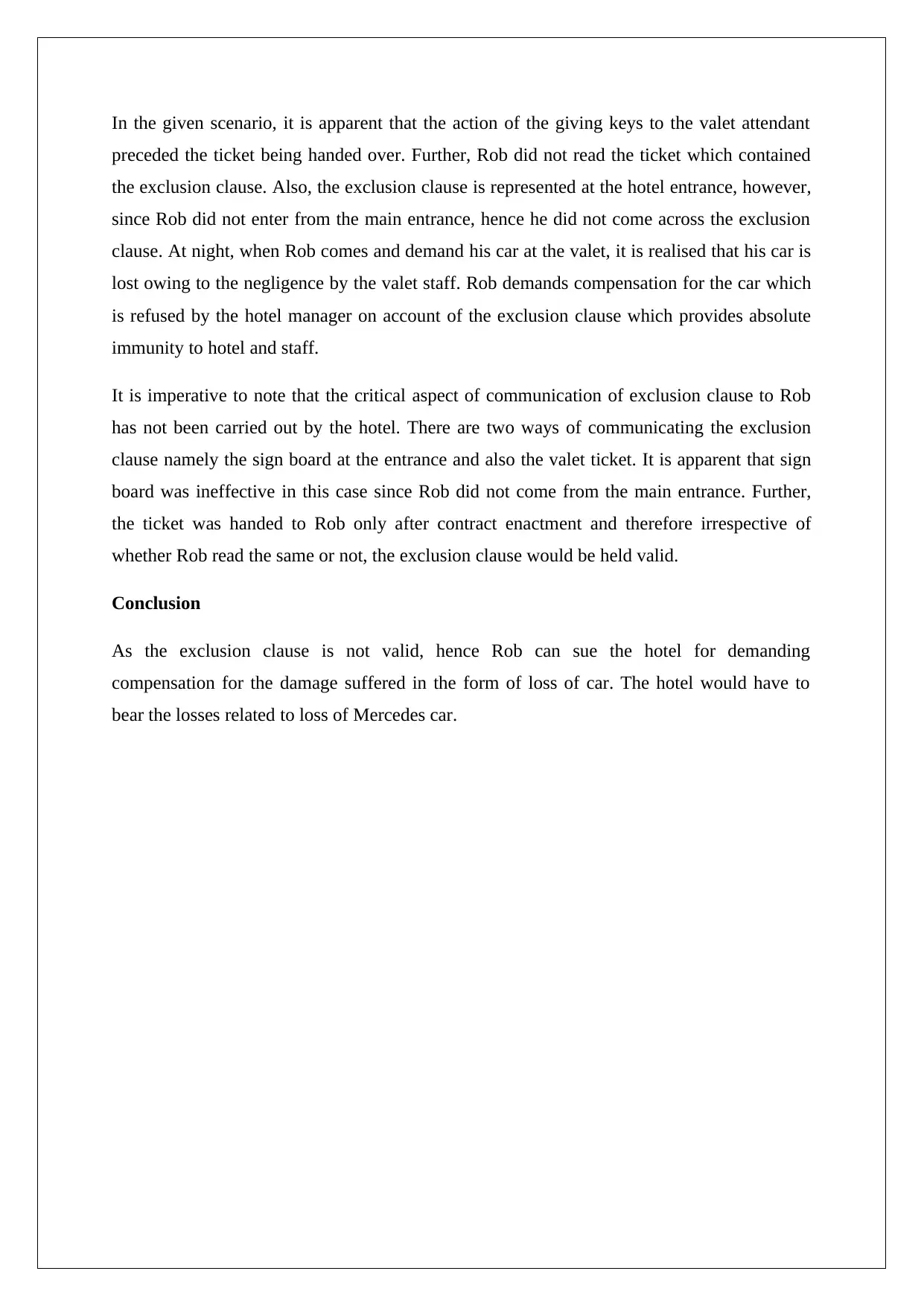
In the given scenario, it is apparent that the action of the giving keys to the valet attendant
preceded the ticket being handed over. Further, Rob did not read the ticket which contained
the exclusion clause. Also, the exclusion clause is represented at the hotel entrance, however,
since Rob did not enter from the main entrance, hence he did not come across the exclusion
clause. At night, when Rob comes and demand his car at the valet, it is realised that his car is
lost owing to the negligence by the valet staff. Rob demands compensation for the car which
is refused by the hotel manager on account of the exclusion clause which provides absolute
immunity to hotel and staff.
It is imperative to note that the critical aspect of communication of exclusion clause to Rob
has not been carried out by the hotel. There are two ways of communicating the exclusion
clause namely the sign board at the entrance and also the valet ticket. It is apparent that sign
board was ineffective in this case since Rob did not come from the main entrance. Further,
the ticket was handed to Rob only after contract enactment and therefore irrespective of
whether Rob read the same or not, the exclusion clause would be held valid.
Conclusion
As the exclusion clause is not valid, hence Rob can sue the hotel for demanding
compensation for the damage suffered in the form of loss of car. The hotel would have to
bear the losses related to loss of Mercedes car.
preceded the ticket being handed over. Further, Rob did not read the ticket which contained
the exclusion clause. Also, the exclusion clause is represented at the hotel entrance, however,
since Rob did not enter from the main entrance, hence he did not come across the exclusion
clause. At night, when Rob comes and demand his car at the valet, it is realised that his car is
lost owing to the negligence by the valet staff. Rob demands compensation for the car which
is refused by the hotel manager on account of the exclusion clause which provides absolute
immunity to hotel and staff.
It is imperative to note that the critical aspect of communication of exclusion clause to Rob
has not been carried out by the hotel. There are two ways of communicating the exclusion
clause namely the sign board at the entrance and also the valet ticket. It is apparent that sign
board was ineffective in this case since Rob did not come from the main entrance. Further,
the ticket was handed to Rob only after contract enactment and therefore irrespective of
whether Rob read the same or not, the exclusion clause would be held valid.
Conclusion
As the exclusion clause is not valid, hence Rob can sue the hotel for demanding
compensation for the damage suffered in the form of loss of car. The hotel would have to
bear the losses related to loss of Mercedes car.
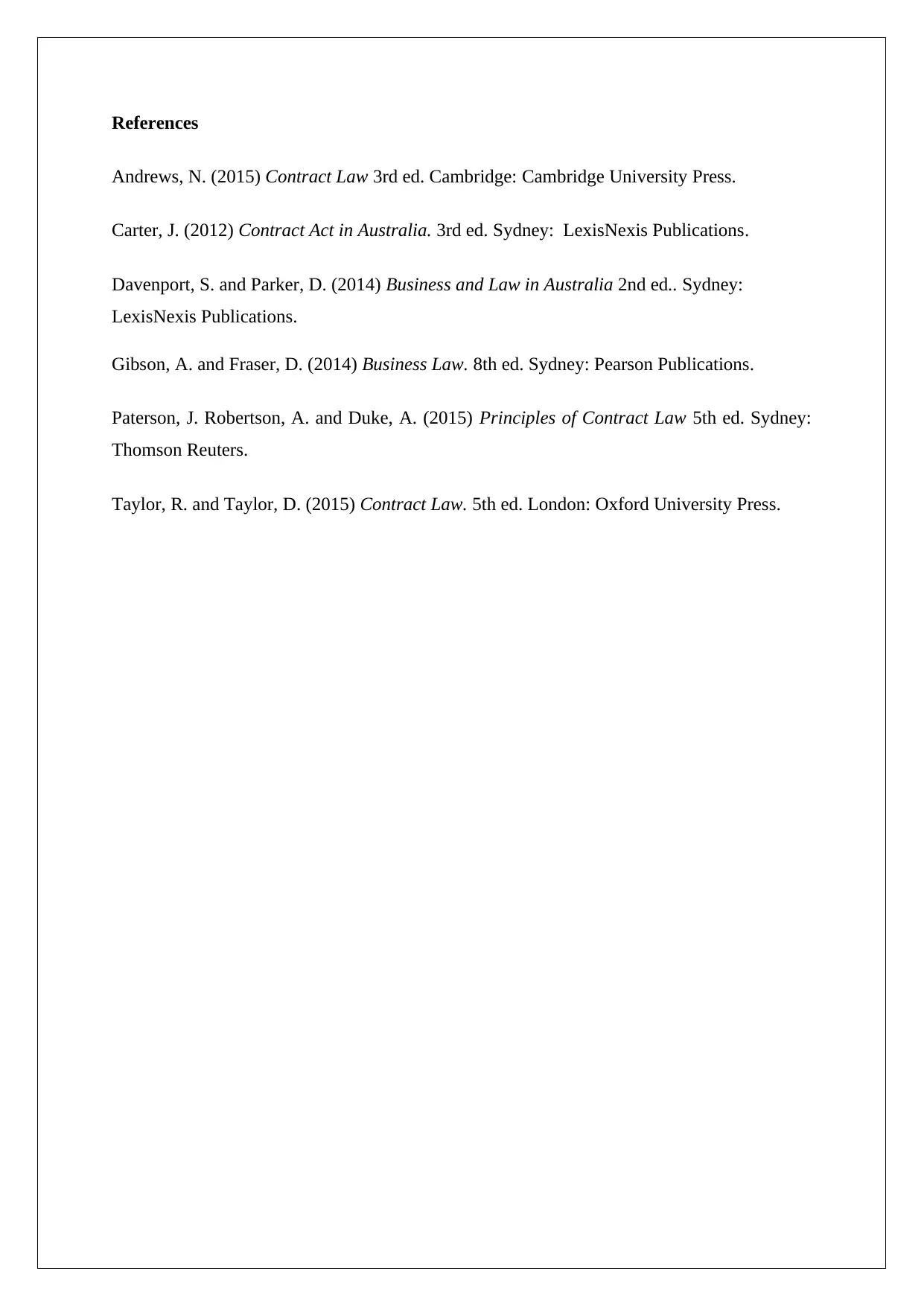
References
Andrews, N. (2015) Contract Law 3rd ed. Cambridge: Cambridge University Press.
Carter, J. (2012) Contract Act in Australia. 3rd ed. Sydney: LexisNexis Publications.
Davenport, S. and Parker, D. (2014) Business and Law in Australia 2nd ed.. Sydney:
LexisNexis Publications.
Gibson, A. and Fraser, D. (2014) Business Law. 8th ed. Sydney: Pearson Publications.
Paterson, J. Robertson, A. and Duke, A. (2015) Principles of Contract Law 5th ed. Sydney:
Thomson Reuters.
Taylor, R. and Taylor, D. (2015) Contract Law. 5th ed. London: Oxford University Press.
Andrews, N. (2015) Contract Law 3rd ed. Cambridge: Cambridge University Press.
Carter, J. (2012) Contract Act in Australia. 3rd ed. Sydney: LexisNexis Publications.
Davenport, S. and Parker, D. (2014) Business and Law in Australia 2nd ed.. Sydney:
LexisNexis Publications.
Gibson, A. and Fraser, D. (2014) Business Law. 8th ed. Sydney: Pearson Publications.
Paterson, J. Robertson, A. and Duke, A. (2015) Principles of Contract Law 5th ed. Sydney:
Thomson Reuters.
Taylor, R. and Taylor, D. (2015) Contract Law. 5th ed. London: Oxford University Press.
⊘ This is a preview!⊘
Do you want full access?
Subscribe today to unlock all pages.

Trusted by 1+ million students worldwide
1 out of 6
Related Documents
Your All-in-One AI-Powered Toolkit for Academic Success.
+13062052269
info@desklib.com
Available 24*7 on WhatsApp / Email
![[object Object]](/_next/static/media/star-bottom.7253800d.svg)
Unlock your academic potential
Copyright © 2020–2026 A2Z Services. All Rights Reserved. Developed and managed by ZUCOL.





